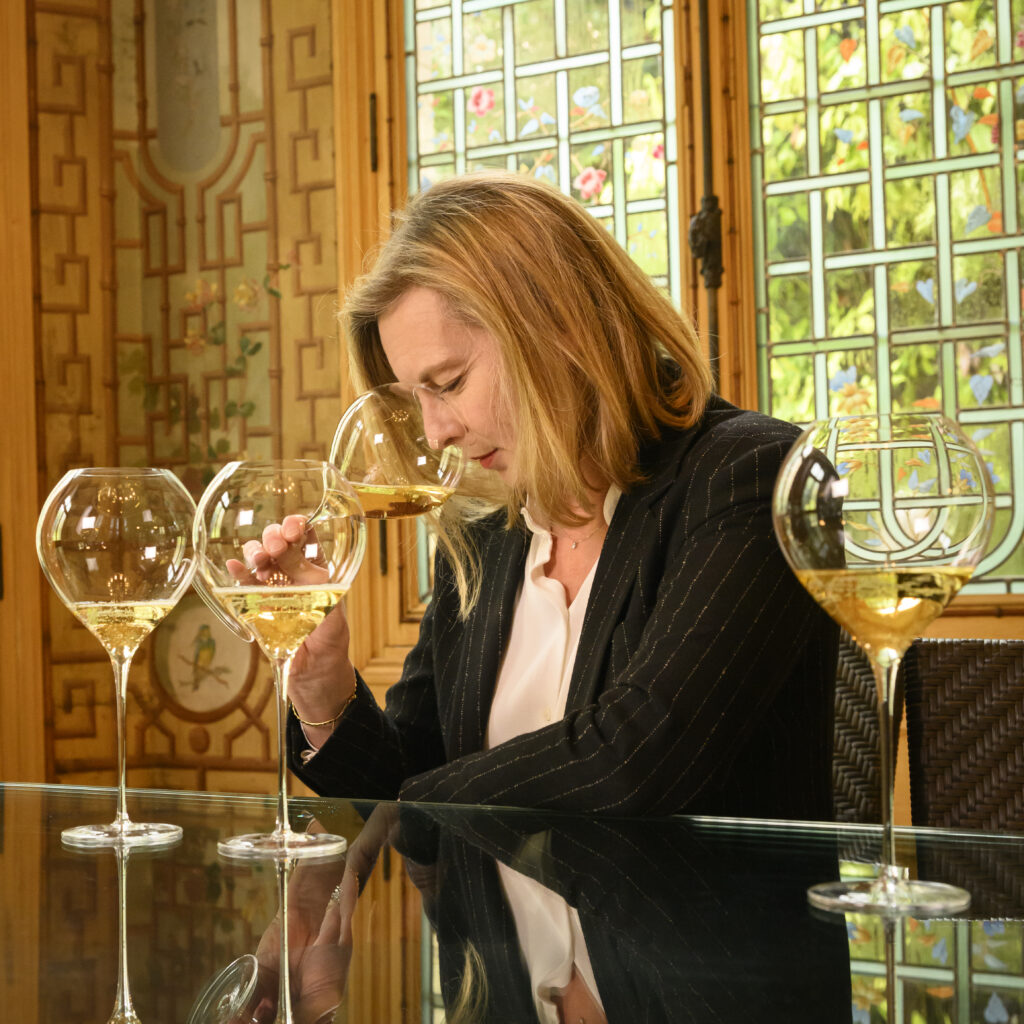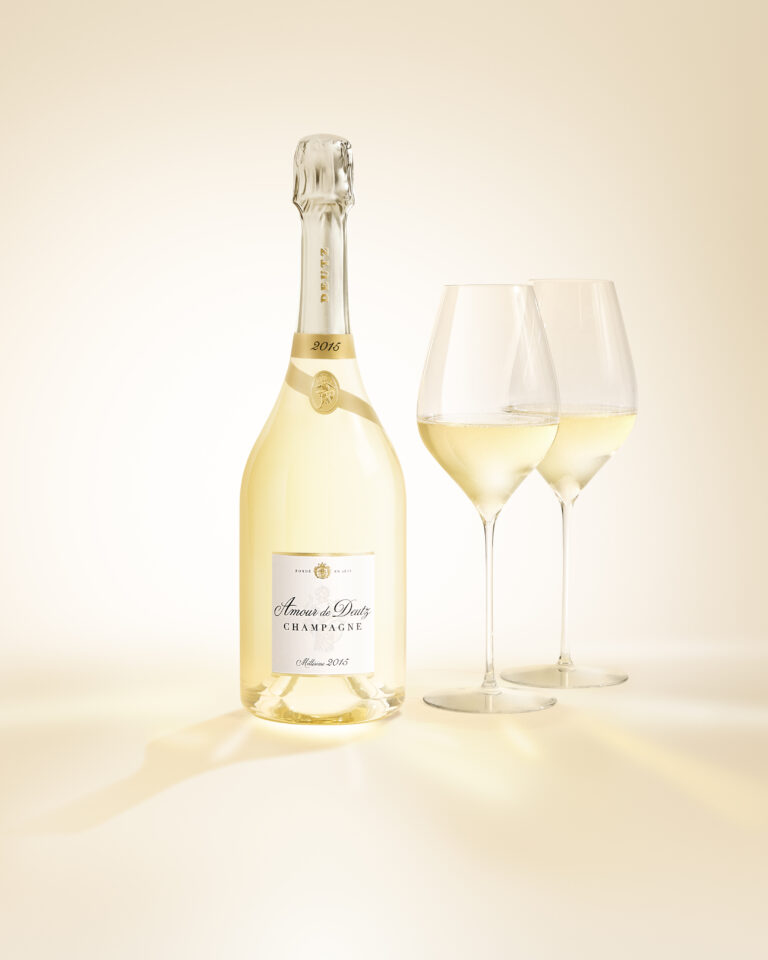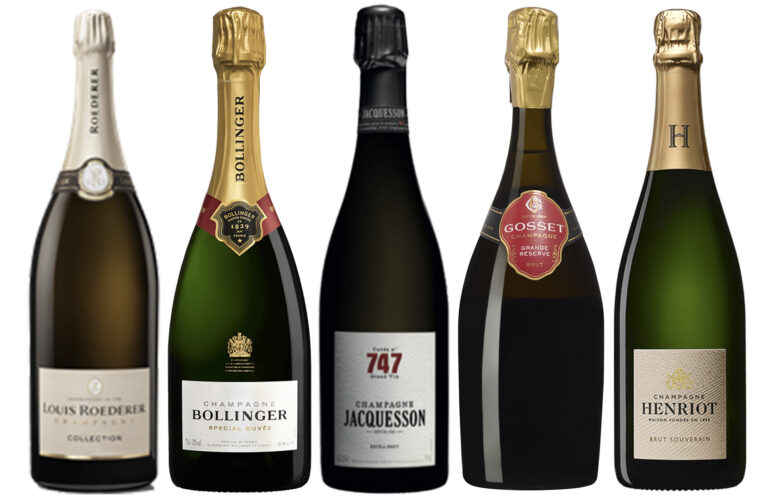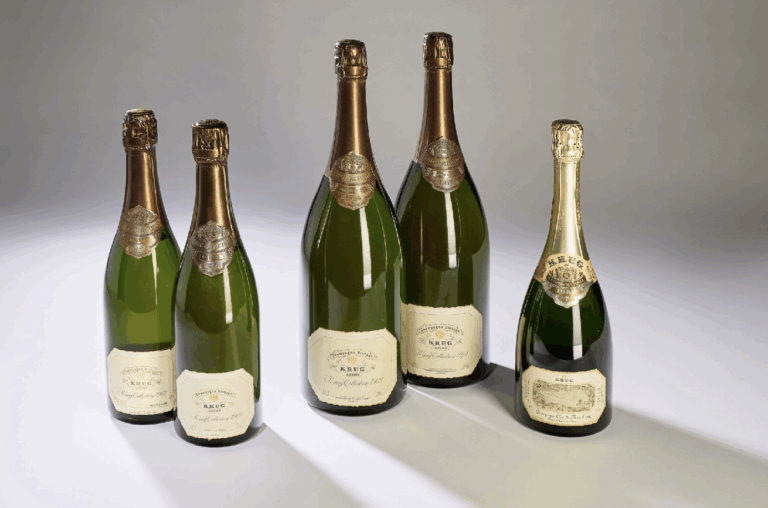Every bottle tells a story. What’s Yours? Every week we interview people in the world of Champagne on their iconic bottles. Now & then TheChampagneSommelier will interview some of the true people of Champagne. He will ask a few questions about their company, their profession, current trends, etc.
We had a bubbly chat with Caroline Latrive from Champagne Deutz in Vertus. Merci Caroline !
Estimated reading time: 10 minutes

THE CHAMPAGNE STORY 2.0
Interview with Caroline Latrive
Chef de caves Deutz
Since her childhood, Caroline Latrive has nurtured a deep passion for wine, passed on by her father, a consulting oenologist. After earning her oenology degree in 1999, she honed her skills at prestigious Champagne Houses such as Bollinger, Piper-Heidsieck, and Charles Heidsieck. In 2012, she was appointed Cellar Master at Maison Ayala, where she stood out for her precision and deep respect for Champagne traditions. In 2022, she joined Maison Deutz, where she continues to uphold the House’s iconic style with precision and expertise, while infusing it with her personal vision and sensibility.

BACKGROUND
How did you enter the world of Champagne?
A true native of Champagne, Caroline Latrive grew up among the vineyards. As the daughter of a consulting oenologist, she was immersed early on in this world, often accompanying her father on his visits to clients. These shared experiences deeply influenced her teenage years and sparked a genuine passion for wine—especially Champagne. When it came time to choose a career path, the decision was obvious, supported with encouragement by her father, who has been a true mentor throughout her journey.
Can you tell us about your career path and what led you to the Champagne world?
After completing all her studies in Reims, Caroline quickly confirmed her desire to become an oenologist, a choice solidified during internships at Charles Heidsieck and Louis Roederer. She pursued the National Diploma of Oenology (DNO) from 1997 to 1999. A formative long internship at Champagne Palmer introduced her to Michel Davesne, (former chef de caves at Champagne Deutz) a pivotal figure in her career.
Upon graduating, she began her career at Bollinger, then joined the Oeno-Champagne consulting firm in 2000, where she worked alongside her father for four years. In 2004, driven by a desire to deepen her knowledge, she returned to her studies and earned a Master’s degree in Oenology and Champagne Wines. She concluded this program with another internship at Bollinger, which marked her return to the House.
In early 2007, she joined Maison Ayala as assistant to the Cellar Master and was promoted to Cellar Master in 2012. Over 15 years, she significantly contributed to the House’s development. At a time when female Cellar Masters were still rare, Caroline made her mark through technical mastery, rigor, and precision.
In 2022, she embarked on a new chapter by joining Maison Deutz. She reunited with Michel Davesne, who supported her in embracing the Deutz style before handing her the reins as Cellar Master. Caroline now brings her own sensibility while honoring the House’s DNA.
Describe yourself in a few sentences.
Driven by a deep passion, I’m known for my loyalty, unwavering dedication, and acute attention to detail. A perfectionist at heart, I also nurture a strong curiosity, always seeking new discoveries and inspirations to enrich my approach to wine.

THE HOUSE
How would you describe the style of your House, and how do you maintain it?
The House style, which I represent with fidelity, is defined by its precision, elegance, and silky texture. I pay meticulous attention to every grape and every wine, always ready to explore new ideas and experiment—always in service of the House style. My obsession with detail is grounded in a strong belief: excellence is built collectively. Harmony and consistency come not only from skill, but also from team cohesion and commitment.
What role do grape varieties play in creating your style?
Grape varieties play a central role in expressing the House’s style. Pinot Noir, the backbone of our wines, brings structure and depth, especially from Aÿ, where it develops a distinctive fruity intensity and saline character. Chardonnay is essential to the blend, adding brightness, freshness, and elegance. Meunier, used sparingly, complements the ensemble with a more immediate and gourmand touch, marked by zesty and expressive fruit notes.
What are the unique characteristics of your terroir?
Maison Deutz cultivates an exceptional vineyard within a 20-kilometer radius of Épernay, at the crossroads of three major Champagne regions: Montagne de Reims, Côte des Blancs, and Vallée de la Marne. This patchwork of parcels—70% of which are classified as Premier and Grand Crus—offers a wealth of soils, subsoils, and exposures, forming the foundation of the House’s refined style.
Each terroir is cultivated with exacting standards to reveal the raw material’s full potential and produce a complex aromatic palette. The parcel-based cuvées are the finest demonstration of this, sometimes made from vines located just meters apart but with distinctly different identities.
At the heart of this vineyard heritage lies Aÿ, the historical birthplace of Champagne and an iconic land for Pinot Noir. Classified as a Grand Cru, this prestigious village is home to over 12 hectares of estate-owned vines, spread across 16 parcels on different parts of the slopes. This geological and climatic richness is something the House strives to highlight, fully aware of its priceless value.



CURRENT LIFE
What does a typical workday look like for you?
No two days are alike, as each is shaped by the key moments in the viticultural and winemaking calendar—harvest, bottling, blending, cellar work. However, one daily ritual remains constant: the 11 a.m. tasting, a cornerstone of our routine. This is a vital team moment that steers our technical decisions with precision and discipline.
What is the best aspect of your job?
This profession offers real creative freedom, allowing full expression of the senses. Each tasting—especially of great vintages—is a living journey through time, a sensory voyage. The arrival of a new harvest marks a fresh start, the beginning of a new vinification cycle full of promises and emotions.
What’s your view on the current trend of terroir-driven, single-parcel Champagnes?
Parcel-based cuvées are the most authentic and precise expression of terroir. Particularly appreciated by connoisseurs, they showcase the unique characteristics of each plot and help reveal the richness of Champagne’s patchwork of soils, exposures, and grape varieties. Like a perfumer, the oenologist carefully composes blends with nuance and finesse, crafting harmony and balance true to the House’s style.
2020 was a particularly unusual year. What short-term outlook do you see for Champagne?
Two heatwaves in late July and early August caused sunburn damage, mainly affecting the black grape varieties. Around 30% of the clusters were impacted, with losses estimated at 10–15%. The water deficit intensified vine stress, visible across the vineyards with yellowing and drying leaves. Such symptoms, especially on chalky soils, are rare and highlighted the extreme drought conditions of the 2020 vintage.
In terms of yield, water shortage limited berry growth, leading to lower volumes than initially forecast. Nonetheless, the grapes were exceptionally healthy and ripe—hallmarks of great vintages. This vintage underlines the increasing need for agility and responsiveness in the face of earlier harvests and wines with rich, concentrated profiles.
FUTURE
What can we expect from Deutz in the coming years?
A new creative energy, driven by a great deal of freedom to experiment. I aim to explore new directions, further refine our terroir expression, and offer bold cuvées—always in line with the House’s style. This creative freedom promises years filled with discoveries, finesse, and innovation in service of Champagne elegance.
How do you see the future of Champagne in a changing climate?
The 2020 vintage clearly reflects the impact of climate change: heatwaves, water stress, lower yields, and altered vine physiology. We’re seeing earlier harvests, higher potential alcohol, lower acidity, and riper aromatic profiles. Adapting both in the vineyard and in the cellar is essential.
This includes gradually transitioning to organic viticulture and exploring varietal diversification. Experimental trials are underway to reintroduce lesser-used or forgotten grape varieties like Pinot Blanc, Arbane, or Petit Meslier.
With increasingly limited yields and naturally richer wines, the challenge in winemaking will be to preserve elegance, freshness, and the identity of great Champagne wines while adapting with finesse to these new climate realities.
PERSONAL
What aspect of your job do you enjoy most?
The creative freedom I have at Maison Deutz—and the wonderful team that helps bring my projects to life.
What has been the biggest challenge of your career?
Early in my career, I worked in a very male-dominated environment. I had to prove myself, show that I was just as capable as my male colleagues. My appointment as Cellar Master was a major milestone, especially in such a demanding context. My first harvest in 2012 was particularly challenging—but everything went smoothly. It was a real baptism by fire. I faced a similar situation upon arriving at Deutz: once again, challenging harvest conditions required adaptability and responsiveness, which I approached with the same determination, drive for excellence, and collective strength.

What is your favorite dish to pair with Champagne?
A delicious ceviche of sea bream or bass, enhanced with a few citrus zests, paired with a glass of Amour de Deutz 2014. On the nose, this cuvée reveals a generous and refined bouquet of ripe yellow fruits—vine peach, mirabelle plum, mango—lifted by floral and honeyed notes. As it opens, hints of pastry, toasted aromas, and spices—caramelized butter, lemon tart, nutmeg—add complexity. The palate is ample and silky, with juicy texture, lively tension, and crystalline freshness. The chalky precision from Mesnil-sûr-Oger shines through. The finish is long and saline, extending into a graceful combination of candied fruit, citrus, and delicate spices. A cuvée that is both intense and subtle—the signature of a great aged Chardonnay.
What do you enjoy drinking besides your own Champagnes?
I love discovering grower Champagnes for their authenticity and unique terroir expressions. For still wines, I have a soft spot for red wines from the Rhône Valley and Pinot Noirs from Burgundy—especially cuvées like Clos des Vignes du Maynes or Perlan Vergelesses, which combine finesse, depth, and personality.
What Champagne would you serve to a dream guest, and why?
Amour de Deutz 2002 in magnum—for the sheer pleasure of sharing this incredible cuvée.
PS: What music would you listen to while sharing Champagne with your dream guest?
A song by Édith Piaf—an iconic French figure I admire deeply.
Merci Caroline !






